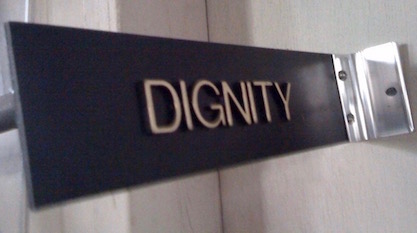 Culture & Ethics
Culture & Ethics
 Medicine
Medicine
Defining Dignity Up


Mom died of Alzheimer’s disease in my home after receiving months of excellent and truly compassionate hospice care that alleviated her physical, mental, and existential symptoms significantly. Mom even had a slight smile on her face at the end.
Dad died naturally of cancer in a Veterans Hospital hospice after receiving months of excellent in-home hospice care that helped him live his last months substantially pain free and able to contemplate life’s deepest meanings.
Sure, both had difficult times — particularly my mother — as did I in caring for and worrying about them. But that’s part of life.
Neither committed suicide by prescribed poisoning nor administered a lethal injection — which we are now told ubiquitously in the media and popular culture, encouraged by assisted suicide advocates, are the true means to “death with dignity.”
I bring this up because we rarely see a strong defense of the inherent dignity in natural dying these days. But Theos has published a fine essay in that regard that I hope readers will ponder. From, “What Does Dignity Really Mean?” (my emphasis):
Many of us fear the loss of independence which old age and illness bring. We fear that when we need other people’s help to move around, wash ourselves, feed ourselves we will lose our dignity. That we will lose control of our bladder or bowels and feel humiliated. Of course we do.
That fear is a reason for defending the fuller, deeper concept of dignity. Dignity cannot and should not rest wholly or mainly in our ability to make self-optimising choices, or be totally ‘together’, impervious to pain or suffering. If we continue to let the concept of dignity be high-jacked to mean choice and independence we will add to the sufferings of those at the end of life.
A non-assisted death is not undignified. No one should feel ashamed of becoming incontinent. Needing the love and care and help of others should be seen as a normal part of the human lifecycle, part of our embodied adventure, not a cause for mental distress. Dignity can be protected and enhanced through tailored, thoughtful, personal palliative care, reassurance, and a sense of humour. Many of our hospices provide dignified deaths day in, day out, helping people feel loved and valued no matter their physical or mental limitations.
Absolutely true.
When you look at the studies of why people decide to commit assisted suicide or be euthanized, a consistent pattern emerges. It is very rarely about pain that can’t be controlled — despite the euthanasia movement’s fear-mongering about that being the reason to legalize euthanasia.
Rather, it involves deep existential fears — primarily (but not exclusively) of losing dignity, meaning a profound worry that we are less worth loving when impaired than we were when healthy.
Even the poster woman for legalizing assisted suicide, Brittany Maynard, gave that as one of two primary reasons for her self-termination.
Sure, with brain cancer, she worried about suffering. Who wouldn’t? But she never tried hospice and apparently accepted a worst case scenario about what her experience would be — which I suspect the suicide pushers whispered in her ear.
And then, she and the assisted suicide movement reacted angrily when good hospice doctors — such as Ira Byock — tried to alert her and the country that death from brain cancer could be peaceful and didn’t have to be a time of uncontrollable suffering.
But also note that she worried deeply about being thought of less well by her family after they witnessed her time of dying. From a column by Maynard published by CNN:
Because the rest of my body is young and healthy, I am likely to physically hang on for a long time even though cancer is eating my mind. I probably would have suffered in hospice care for weeks or even months. And my family would have had to watch that.
I did not want this nightmare scenario for my family, so I started researching death with dignity. It is an end-of-life option for mentally competent, terminally ill patients with a prognosis of six months or less to live. It would enable me to use the medical practice of aid in dying: I could request and receive a prescription from a physician for medication that I could self-ingest to end my dying process if it becomes unbearable.
I quickly decided that death with dignity was the best option for me and my family.
In other words, she was terrified that dying naturally would not have been dignified, and therefore — bluntly stated — she felt the need to put herself out of her family’s misery as an act of love! Imagine how awful that must have felt.
And imagine what kind of an abandoning society we will establish if we allow fears of losing dignity or being a burden to become substantially grounded in reality and accepted as the norm to justify support for suicide.
How often do we hear the ill, elderly, and people with disabilities worry about being a burden or losing dignity? Isn’t that another way of saying we worry that we are no longer worthy of being loved unconditionally? Isn’t it a fear of being considered of reduced value when we need care or if our condition causes our family grief and anxiety? Isn’t it to accept that once we are not as good looking as we were when healthy and may have some odor issues, the time has come to go?
And then, when such concerns make people suicidal, we coldly offer “choice” instead of suicide prevention and other ameliorating interventions.
That’s not on people who have those fears. It is on us for creating a society in which people so readily believe that suicide, rather than dying naturally with proper care, is the “dignified” way out.
Photo credit: Jan McLaughlin, via Flickr.
Cross-posted at The Corner.
